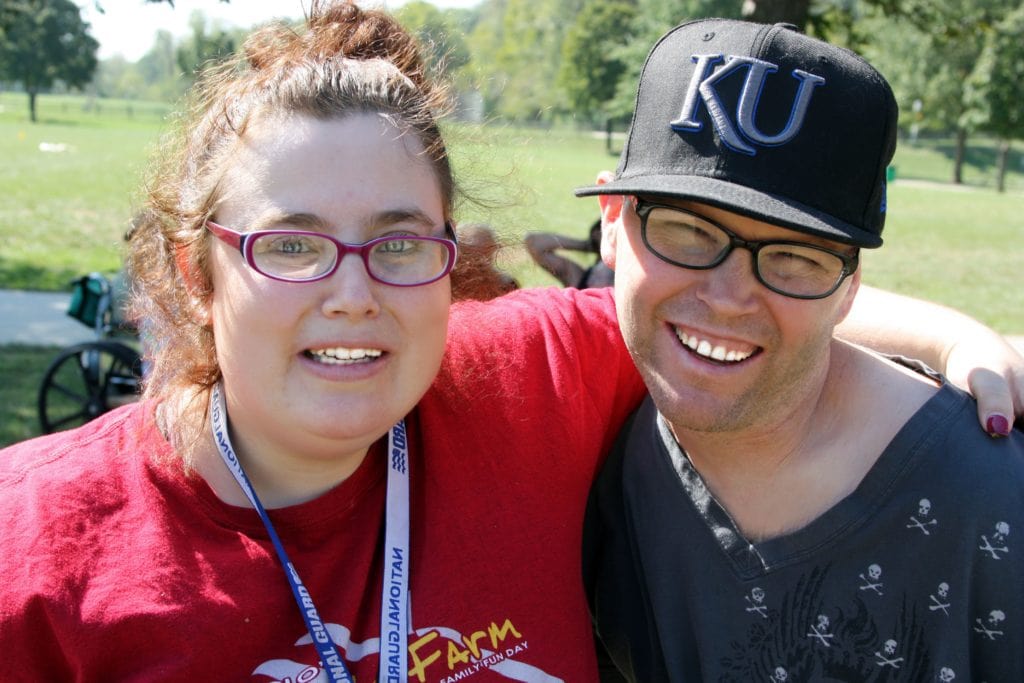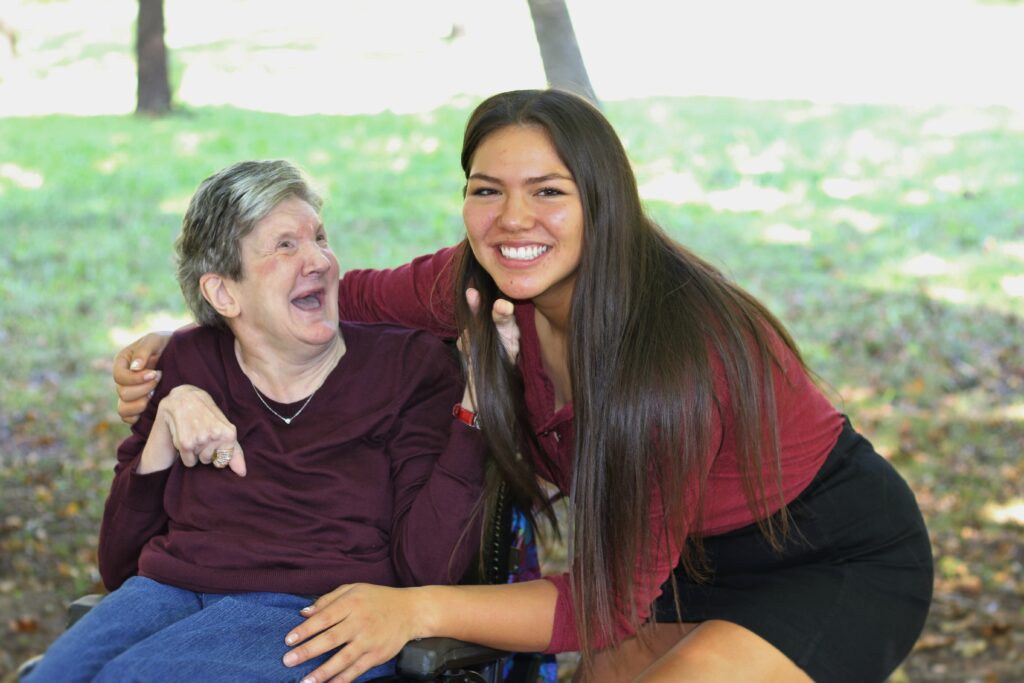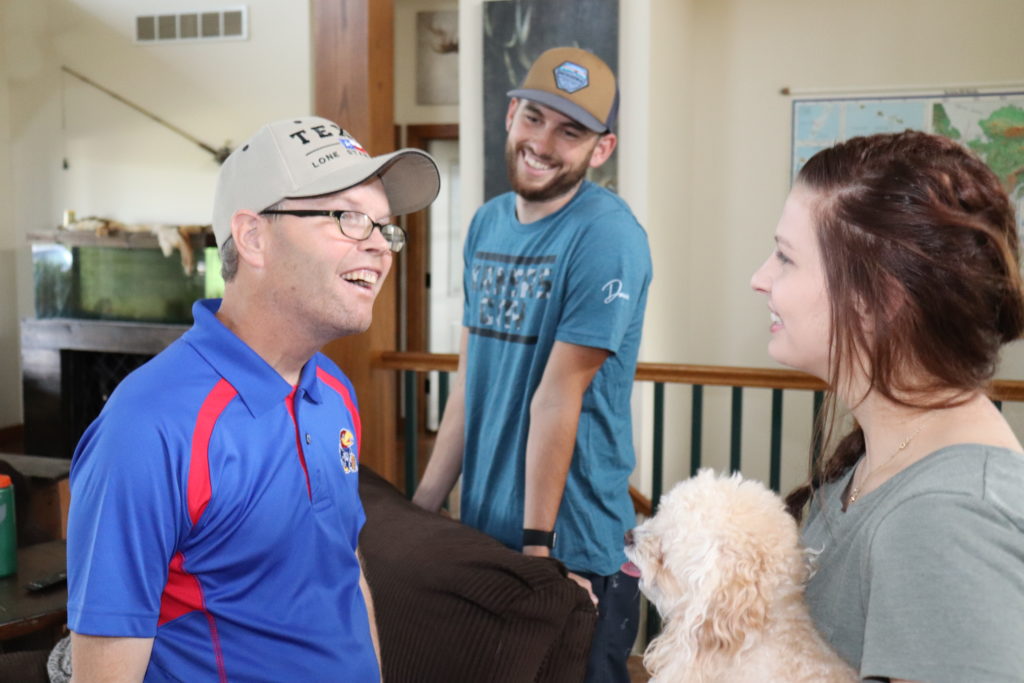Avoid Group Homes
Shared Living providers are an extension of your family. Our Shared Living solution helps your loved one avoid group homes, with the added benefit of living in a private home environment.
A Lifestyle Choice
Family-style living is one of the most attractive aspects of the Professional Family Teaching Model. The extended-family atmosphere is vital and plays a significant role in the care of people with special needs. We know our residents well, and we do everything we can to match individuals with a professional family that will cultivate their interests and exceed at meeting their needs. When an individual with I/DD experiences one-on-one care, respect, love, and learning in a consistent family-like environment, their quality of life improves—that’s when we see everyone truly thrive. Our specialized matching process ensures that parents and guardians, our Professional Family Teachers, and the person served, all benefit from becoming an extended family.
Professional Family Teaching
Professional Family Teachers are the program’s most valuable resource. These contractors are not only screened, trained, and monitored but they are respected, valued, and supported in all aspects of family life. A Professional Family Teacher’s most important role is being a teacher, above and beyond being a caregiver for the person in their home.
Hear from The Sanders about their experience as Professional Family Teachers:

Ed
Shared Living Resident
"I am so happy! I love living here because I get to learn new things and make new friends."
A Parent’s Perspective on Shared Living
If you’re a parent or guardian of a person with disabilities, it’s often helpful to hear from others who have loved ones in Shared Living. Hear from Allison and Trip Frizell on their son, Tom’s, experience with Shared Living.
Why Our Shared Living Model is Successful
Not too long ago, we interviewed Whitney Lamb, Director of Regional Professional Family Services, about our Shared Living program and what makes it so special. See what Whitney has to say about Shared Living.
Success Is In Our Numbers:
Satisfaction
In our latest 2021 survey, Parents and Guardians of individuals served rated their satisfaction with the program an average of 3.69 out of 4 regarding the quality of services provided to their family member.

Turnover
National turnover exceeds 50%, often nearing 70% for residential programs! The average turnover of Family Teaching contractors within the Professional Family Teaching Model, annually since 1999, ranges between 2-5%.

Longevity
Professional Family Teaching homes have an average length of placement of 7 years, and GoodLife’s longest home placement has been paired for 19 years!

Shared Living Contractors
Our Shared Living Contractors (also called Professional Family Teachers or PFTs) are pre-screened, professionally trained, and very carefully matched with an individual. They are subject to regular in-home reviews, supervision, and must achieve high standards on annual in-home reviews of care. Most shared living contractors have been supporting individuals with disabilities professionally prior to becoming a professional family teacher. It is common for the shared living contractor to have known the person with disabilities and their family for many years prior to placement and to have served them in other capacities.
What does it take to become a Shared Living Contractor?
Are you interested in becoming a Professional Family Teacher? If you're curious and would like an in-depth look at what it's like to be a Professional Family Teacher, watch our interview with one of our Shared Living Contractors, Catina, or check out our Brochure for in-depth information on life as a PFT and what you can expect in this role.
Shared Living BrochureNaunna Delgado
Professional Family Teacher
Our professional family home is the perfect space for our extended family. What makes it even more special is the fact that we have all contributed to making it comfortable, cozy and functional! Not just my husband and I but also our two children and the two guys we've served for more then 10 years have had a lot of input in how things are organized logistically and aesthetically. We've been blessed to live and grow together as a professional family in a wonderful neighborhood in a beautiful home, surrounded by friends, neighbors and a great support system.
Become A Professional Family Teacher
Core Values
Our Path and Purpose
- Treat people with dignity and respect
- Build meaningful relationships
- Provide opportunities for learning and growth
Shared Living FAQ
Below are some of the most common questions we’ve received from Parents and Guardians. Don’t see your question below? Reach out to us!
What is the timeline for placement?
The length of time for placement varies from case to case and is dependent on several factors. Our ultimate goal is to create a long-term, positive, and successful placement that supports the needs of the individual and provides the most meaning to their life. Therefore, time and care is taken in all steps of the recruitment, screening, training, and matching parts of the placement process to ensure the individual and provider are the best match possible. Due to the nature of this program being based in relationships, the placement process is not quick. The selection and matching process, in addition to state approval, determines the length of placement.
How are Professional Family Teachers paid?
Our Professional Family Teachers are contractors with GoodLife, not GoodLife employees. This distinction is important because, as an independent contractor, a Professional Family Teacher’s compensation is tax-free. We highly value our Shared Living program so GoodLife provides grants and housing assistance to Professional Family Teachers who are new to the program so they can get up and running in their own home.
Several factors are considered when determining the amount of money paid to a Professional Family Teacher, including:
• The level of need of the person to be served, including behavioral support and medical support
• Whether the Professional Family Teacher will provide residential services only or residential and day services for the person served
• The Professional Family Teacher’s certification status
What do we pay for this service? What living expenses might we need to pay for out of pocket?
The person served would contribute only what they can afford towards the expenses to the Shared Living home, up to a predetermined maximum amount each month. When determining how much an individual can contribute, GoodLife considers the individual’s income and sets aside a set amount each month that the individual can spend on personal items and fun activities.
What Respite is available to Professional Family Teachers to prevent “burnout”?
Professional Family Teachers are responsible for supervising the person served 24-hours a day if they are providing both residential and day services. If the Professional Family Teachers provide residential services only, they are responsible for the person served during mornings, evenings, weekends, days when the person is sick, and for days that day services are not provided. This can be a lot to handle and we recognize that our Professional Family Teachers need a break sometimes. GoodLife requires that respite for Professional Family Teachers be part of the contract and, when we build a Shared Living contract, we agree upon a pre-specified amount of respite. There are two types of respite:
1. Natural Supports – people within the Professional Family Teacher’s network and the network of the person served (e.g., family or friends of the Professional Family Teacher or person served). The Professional Family Teacher must provide their friend/family member with individualized orientation/training. Other Professional Family Teachers can also be used to provide support.
2. Paid Supports – generally, staff employed by the Professional Family Teachers or staff covered through GoodLife for a fee. The fee is the responsibility of the Professional Family Teacher.
What happens if my loved one loses mobility and needs assistance from a wheelchair or walker?
Prior to placement, a resident’s anticipated needs are considered in determining the best Professional Family Teaching home. Any time the needs of an individual change, however, the individual’s core team determines how best to support them. Adaptations to the home, the schedule, or support services can be made to maintain placement.
Can we have our loved one overnight and/or go on vacation with us?
Yes! We believe in helping our residents maintain close relationships with family members. Residents can and do go on vacations with their families and sometimes even with their Professional Family Teachers.
Can the Professional Family transport my loved one to me on a regular basis?
The Professional Family Teacher and the loved ones’ family develop a plan that works for everyone for visits that takes into consideration a variety of factors such as distance, weather, frequency, etc. The plan is reevaluated often to make sure everyone is happy.
What happens to my loved one if the Professional Family Teacher cannot serve my loved one any longer?
If the Professional Family Teaching placement were to end for any reason, the person served would move out of the Professional Family Teaching home and GoodLife would work with their team to identify an appropriate option for them that may or may not include another Professional Family Teaching home.
I’ve heard a lot of different terms used at GoodLife. What’s the difference between “Shared Living”, “PFTM”, and “Professional Extended Family Model”?
There is no difference. Our Professional Extended Family Model and Professional Family Teaching Model (PFTM) are both terms used to describe our Shared Living models. Sometimes, it can get challenging to accurately describe what a program is by its title, so these are all terms we’ve used to describe the same program. We refer to the providers that care for our Residents in this Shared Living-style model as Professional Family Teachers.
Parents/Guardians
Are you a parent/guardian interested in receiving more information about Professional Family Teaching model?
If you have additional questions, contact:
Nichole Reiske, Director of Intake
nicholereiske@mygoodlife.org or 913-980-8135.
If you’re ready to get started, contact us to see if GoodLife is a fit for you.
Providers
Do you have a special connection with someone receiving services? Are you ready to take your caregiving career to the next level? We look forward to connecting with you about this amazing program and opportunity.
To learn more about becoming a Professional Family Teacher, contact:
Natalie Quinn, Quality Specialist
pftmprogram@mygoodlife.org or 785-917-1752.



